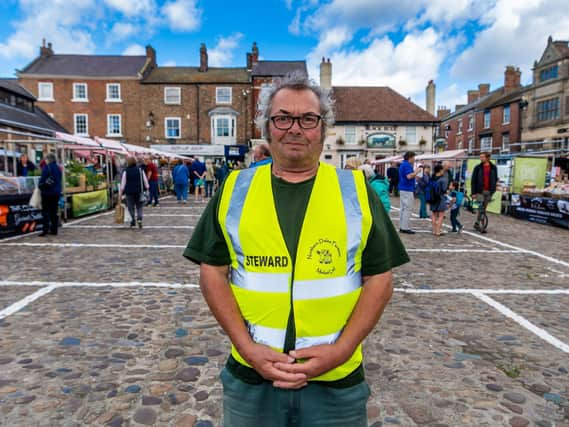Northern Dales Farmers Markets re-open this weekend and organisers are confident people will continue to 'shop local'


Nigel Davison who farms at Ings Farm in Great Broughton has been at the helm of Northern Dales Farmers Markets.
For the past 12 years, he has taken on the management of seven in North Yorkshire and Teesside, which this weekend will see the first open for business in 2021.
Advertisement
Hide AdAdvertisement
Hide AdStokesley will open on Saturday and Thirsk on Sunday, which Nigel said he is hoping will see similar trading to their previous return in June 2020.
“When we came back after the first lockdown the reaction was incredible,” he said. “People really seemed to have got the gist of buying local and our following increased massively.
“I’m sure that was also enhanced by people not wanting to manoeuvre a trolley around a packed supermarket and a preference for the open air.”
Having taken a break in January due to a combination of winter weather, a poorer trading time of year and the new lockdown, this weekend’s predicted weather forecast may dampen the footfall but Nigel said he believes the momentum is still there for buying direct from farmers.
Advertisement
Hide AdAdvertisement
Hide Ad“The weather is the one thing we can’t control, but I have always been convinced that farmers markets have legs.
“I first became involved in 2002 when Stokesley Farmers Market was being set up. It was early days for Northern Dales Farmers Markets, which was founded by farmer Alistair Davy from Marske near Richmond, but I believed in its ethos right from the start.
“It’s a great platform to start a business and allows you to trade with low overheads.”
Nigel, a farmer’s son, initially became involved through his own garden plant business which he developed at Ings Meadows Nurseries in 1997.
Advertisement
Hide AdAdvertisement
Hide AdHe said he had been finding it hard to find a market stall to sell his herbaceous perennials and alpines anywhere but Stokesley’s existing regular weekly market.
“I was convinced that people liked buying direct from producers,” he said.
“I had first-hand experience of talking with my customers both at a market and at the nursery but I felt farmers markets made all the difference.
“The government directive had been to open up the countryside after the foot and mouth epidemic of 2001 and this new type of market ticked all the boxes and also gave me the opportunity I had been looking for to sell elsewhere.”
Advertisement
Hide AdAdvertisement
Hide AdIt was as a boy that Nigel said he first realised the importance of what was produced on a farm.
“My dad was a dairy farmer in the days when our milk churns were still being collected at our farm gate by the end of our lane.
“He used to say that myself and my brother Howard were brought up on the monthly cheque.”
Selling milk and meat on market stalls was how a farmers cooperative in the Yorkshire Dales first came about in the 1920s, which eventually became Asda.
Advertisement
Hide AdAdvertisement
Hide AdNigel said he is convinced that the direct contact between farmers and consumers is more important than ever.
He also said he believes farmers markets such as the Northern Dales group have learned important lessons in their own marketing and branding.
“We now have a following and because our farmers markets are monthly, shoppers will travel, when Covid restrictions allow, to the different venues each week to buy their meat and vegetables from the same stallholders.”
This would not have been as easy in the early years as the farmers markets were strung out as far as Settle and Skipton to Stokesley and Hartlepool.
Advertisement
Hide AdAdvertisement
Hide AdNigel said keeping the group of markets within a 25-mile radius has brought about a greater community spirit among the producers and buyers.
It has also proved far more manageable in terms of the logistics.
“When he started, Alistair bought six trailers that each had ten collapsible flat pack stalls, which we continue to put up in concertina style.
“It was a great idea as stallholders then only had to set up their wares when they come and as they are all uniform in size they look good.
Advertisement
Hide AdAdvertisement
Hide Ad“I helped him with them, but getting them to Skipton and Settle was quite demanding.
“Today, I have help from rare breed pig farmer Nigel Wreford and since the markets are all local I get another hour and a half in bed, rather than getting up at three in the morning.”
Stokesley has grown to become Northern Dales’ largest market and won a UK Farmers Market of the Year award in 2014.
Nigel said he has plans in place for a return to Northallerton this year.
Advertisement
Hide AdAdvertisement
Hide Ad“We have been approached by Hambleton Council whom we already have a good relationship with over at Thirsk.
“We pulled out of Northallerton a few years ago because we were trading alongside the regular weekly market and I felt that it wasn’t working and was against the ethos of a farmers market.”
Nigel said not every farmers market works and there have been many casualties along the way throughout the country, but for each one that doesn’t another does and he said he finds it hard to know why some take off where others fail.
“They don’t work everywhere. Easingwold, where you might expect a farmers market to be well supported has always struggled, and we had the same at Bedale, but Stewart’s Park in Middlesbrough is completely different.
Advertisement
Hide AdAdvertisement
Hide AdNigel also attributes Northern Dales more recent successes to others who are now directors.
“Julie and Nigel Fletcher joined us with their Pie Jackers stall and they have been a breath of fresh air utilising their other skills in PR, social media and graphic design,” he said.